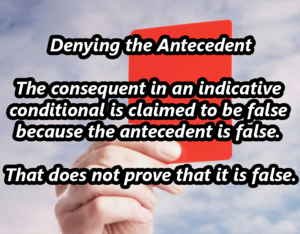Denying the Antecedent
Return to Logical Fallacies
Contents
Description
Denying the Antecedent
The consequent in an indicative conditional is claimed to be false because the antecedent is false
This fallacy can be seen as a defective (invalid!) use of the modus tollens argument form. Recall that one of the premises in modus tollens denies the consequent of the hypothetical premise. In the fallacious example below, however, the antecedent, is denied instead of the consequent:
Names
Denying the antecedent, inverse error or fallacy of the inverse.
Types
Deductive Logical Argument, Formal Argument
Deductive Logic Fallacies: These are fallacies that arise from errors in the formal logic. For example an error in a mathematical proof.
logical Form
If A, then B; not A, therefore not B.
Examples
Discord Examples
- 1
If we would see forever (if A) then the earth would be flat. (then B) we don't see forever. (not A) therefore the earth is not flat. (therefore not B)
ask it in the above format make them agree then ask them if the following is logical...
- 2
if we saw flying unicorns everywhere (if A) then the earth would be a globe. (then B) we don't see flying unicorns everywhere. (not A) therefore the earth is not a globe. (therefore not B)
this form of argument is called denying the antecedent... we can show you how you would not see forever through a medium like air. so this is invalid and defective in form, the correct form of this argument is modus tollens
Other Examples
- 1
If Queen Elizabeth is an American citizen, then she is a human being. Queen Elizabeth is not an American citizen. Therefore, Queen Elizabeth is not a human being.
one does not have to be an american citizen to be a human being...
so regardless
even though some would debate if she is a human being, before that conclusion is jumped too, more evidence would be required, until such a time as she is proven not human we must take things at face value.
- 2
Premise 1: If I’m cleaning the kitchen, then I’m not reading my book. Premise 2: I’m not cleaning the kitchen. (The denial of “cleaning” is “not cleaning.”) Conclusion: Thus, I am reading my book. (The denial of “not reading” is “reading.”)
This too is defective reasoning, if you think about it. Not being engaged in kitchen cleaning does not by necessity, infer that I am reading. I could be doing anything besides cleaning the kitchen.
Weakness
One way to demonstrate the invalidity of this argument form is with a counterexample with true premises but an obviously false conclusion.
Extra information
Arguments of this form are invalid. Informally, this means that arguments of this form do not give good reason to establish their conclusions, even if their premises are true.
The name denying the antecedent derives from the premise "not P", which denies the "if" clause of the conditional premise.
One way to demonstrate the invalidity of this argument form is with an example that has true premises but an obviously false conclusion. For example:
If you are a ski instructor, then you have a job. You are not a ski instructor Therefore, you have no job
That argument is intentionally bad, but arguments of the same form can sometimes seem superficially convincing, as in the following example offered by Alan Turing in the article "Computing Machinery and Intelligence":
If each man had a definite set of rules of conduct by which he regulated his life he would be no better than a machine. But there are no such rules, so men cannot be machines.
However, men could still be machines that do not follow a definite set of rules. Thus, this argument (as Turing intends) is invalid.
It is possible that an argument that denies the antecedent could be valid if the argument instantiates some other valid form. For example, if the claims P and Q express the same proposition, then the argument would be trivially valid, as it would beg the question. In everyday discourse, however, such cases are rare, typically only occurring when the "if-then" premise is actually an "if and only if" claim (i.e., a biconditional/equality). The following argument is not valid, but would be if the first premise was "If I can veto Congress, then I am the US President." This claim is now modus tollens, and thus valid.
If I am President of the United States, then I can veto Congress. I am not President. Therefore, I cannot veto Congress.
Ref Rulings
for quick and easy fallacy moderation
Objection Stands
Objection stands, That is Denying the Antecedent.
The consequent in an indicative conditional was claimed to be false because the antecedent is false. but that does not prove it false.
please reformulate the argument without this fallacy or concede and move on. failure to do either and you'll forfeit the debate.
Objection Removed
Objection Removed, that is not denying the antecedent.
Denying the antecedent means The consequent in an indicative conditional is claimed to be false because the antecedent is false. That does not prove that it is false.
Please reformulate the counter argument without the fallacy fallacy variation or concede and move on. Failure to do either and you'll forfeit the debate. Please continue.


